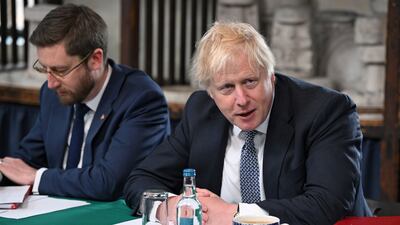UK Prime Minister Boris Johnson has told ministers to cut about 90,000 government jobs to try to save £3.5 billion ($4.3bn) a year to tackle the rising costs of living for Britons.
The cuts amount to a fifth of civil servants and would reduce staffing to the levels of 2016 before a Brexit and Covid-19-related surge in recruitment.
Unions representing government staff warned that the cuts could have an impact on processing passports and running an efficient borders service.
“We have got to cut the cost of government to reduce the cost of living,” Mr Johnson told the Daily Mail newspaper. He reportedly told his cabinet of the plans on Thursday.
Plans for the cuts emerged following clashes between the minister for efficiency, Jacob Rees-Mogg, and unions about civil servants returning to the office after the Covid-19 lockdown. Many still work from home.
Mr Rees-Mogg said there was already duplication in departments and claimed the introduction of new technology could bring further efficiency.
He described the £3.5bn figure as a “realistic but relatively unambitious figure” but declined to be drawn on how the savings would be spent.
“Overall the civil service needs fewer people and that’s something that will be done by ever department,” he told the BBC.
The current headcount stands at 475,000 and Mr Johnson has reportedly asked for the cuts to take place over two years, allied to a recruitment freeze.
Mr Johnson’s government has come under intense pressure to help families with rising prices, particularly for food and energy.
Dave Penman, general secretary of the FDA civil service union, said the increase in jobs was necessary to “deal with the consequences of two unprecedented events — Brexit and the Covid pandemic”.
“To govern is to choose and ultimately this government can decide to cut the civil service back to 2016 levels, but it will also then have to choose what the reduced civil service will no longer have the capacity to do. Will they affect passports, borders or health?” he said.


